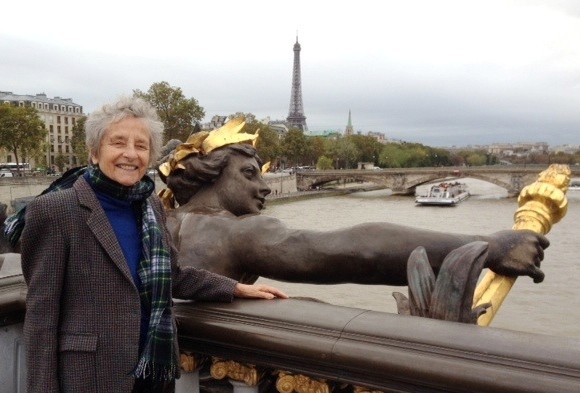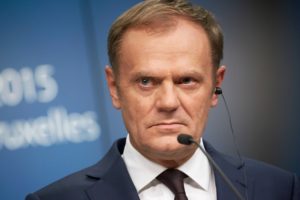
This was a very good editorial, civilized and compassionate. It avoided throwing oil on the fire, playing the blame game or making doomsday predictions.
On March 30, in le Monde, an editorial appeared under the following title: “An Appeal to London and the 27.” Actually it was a collective message published simultaneously by The Guardian, Le Monde, La Vanguardia and Gazeta Wyborcza.
One cannot undo 44 years of social, economic and human ties with just a strike of a pen — that was the four newspapers’ message. The collateral damage will be felt on both sides of the English Channel. Three million Europeans live in the UK and more than two million British expats live on the continent. The fate of those five million people is at stake.
The authors of the editorial suggested the Brexit process should be started on a positive note and tend to the status of the expatriate nationals right away, before starting the negotiation process.
But the day after Donald Tusk, president of the European Council, parted emotionally with the Euroskeptic David Davis British envoy, the head-on confrontational negotiations started in earnest.
Like a chess player, Theresa May decided that attack was the best strategy and she put the central demands of the UK on the table: first, treat simultaneously the details of the “divorce” and the future of commercial relations between the UK and the European Union (EU); second, organize the future of security cooperation.
Europe shot back in no uncertain terms. Angela Merkel said Germany wanted to tackle other matters first and so did Francois Holland, Donald Tusk and Michel Barnier, the chief negotiator for Europe. The basic position of the Europeans is that no negotiations on free trade should start until the UK has left the EU totally and become a third-party country.
The European Union (EU) wants discussions to proceed “per phases,” starting with “reciprocal and non discriminatory” guarantees as to the status of the Europeans living the UK and the 60 billion Euros already obligated by the UK to the budget of Europe. An extremely sensitive point will be for the UK to abide by the decisions taken by the European Court of Justice located in Luxembourg.
As far as the negotiations concerning the future relations between the two parties, some topics promise to be particularly stormy, particularly the “social, fiscal and environmental dumping” or whether to preserve the “financial passport” allowing the City of London to sell financial products on the continent. The Europeans oppose discussions per economic sector, as wanted by Theresa May, and bi-lateral agreements to be signed between the UK and any of the EU members.

On March 31, Donald Tusk, gave a crucial six-page document to the 27 members of the EU laying down the essential principles of the negotiations to come. The text should be formally accepted by them on April 29 at a summit meeting in Brussels.
Obviously the presidential elections in France will have an impact on the negotiations. Marine Le Pen applauds an event which will make Europe more fragile. At the opposite end of the political spectrum, Emmanuel Macron (En Marche party) feels the access to the Common Market has a price and should be balanced by contributions to the European budget. François Fillon (Les Republicains or LR ) supports a firm attitude toward the British demands. He thinks that the Le Touquet agreement needs to be modified and the borders moved from Calais to Dover.
The ideal scenario would be to have the parties agree on these first phases so that discussion on the future should be tackled by the beginning of 2018.
The tone of the difficult negotiations has been set. It will be a roller-coaster ride for months to come.
Editor’s Note: This is the opinion of Nicole Prévost Logan.
 About the author: Nicole Prévost Logan divides her time between Essex and Paris, spending summers in the former and winters in the latter. She writes a regular column for us from her Paris home where her topics will include politics, economy, social unrest — mostly in France — but also in other European countries. She also covers a variety of art exhibits and the performing arts in Europe. Logan is the author of ‘Forever on the Road: A Franco-American Family’s Thirty Years in the Foreign Service,’ an autobiography of her life as the wife of an overseas diplomat, who lived in 10 foreign countries on three continents. Her experiences during her foreign service life included being in Lebanon when civil war erupted, excavating a medieval city in Moscow and spending a week under house arrest in Guinea.
About the author: Nicole Prévost Logan divides her time between Essex and Paris, spending summers in the former and winters in the latter. She writes a regular column for us from her Paris home where her topics will include politics, economy, social unrest — mostly in France — but also in other European countries. She also covers a variety of art exhibits and the performing arts in Europe. Logan is the author of ‘Forever on the Road: A Franco-American Family’s Thirty Years in the Foreign Service,’ an autobiography of her life as the wife of an overseas diplomat, who lived in 10 foreign countries on three continents. Her experiences during her foreign service life included being in Lebanon when civil war erupted, excavating a medieval city in Moscow and spending a week under house arrest in Guinea.